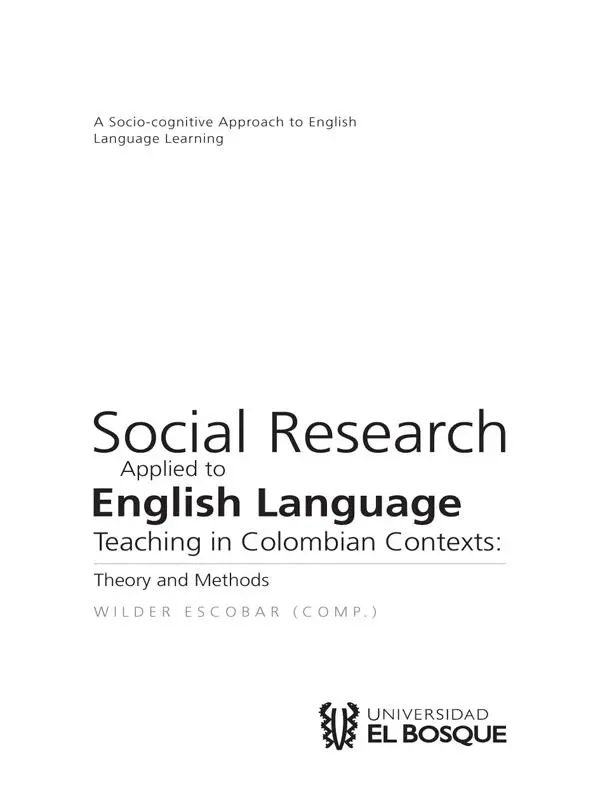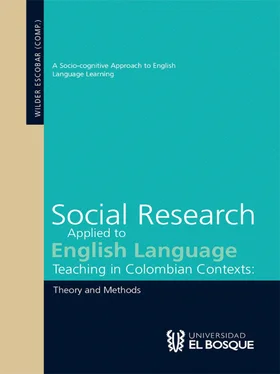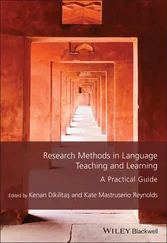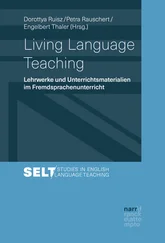
300.72
E72s
ESCOBAR ALMÉCIGA, Wilder Yesid (comp.)
Social Research Applied to English Language Teaching in Colombian Contexts.
Theory and Methods / compilador Wilder Escobar ; editor Wilder Yesid Escobar Alméciga. -- Bogotá : Universidad El Bosque, 2013. -- 190 p.
ISBN: 978-958-739-028-5 (IMPRESO)
1. Inglés-enseñanza-investigación social I. Escobar Alméciga, Wilder Yesid, ed.

© Universidad El Bosque
© Editorial Universidad El Bosque
© Wilder Yesid Escobar Alméciga (comp.)
Rector
Carlos Felipe Escobar Roa
Vicerrector Académico
Miguel Ruiz Rubiano
Vicerrector Administrativo
Rafael Sánchez París
División de Investigaciones
Editorial Universidad El Bosque
Dirección: Carrera 7b Bis N.° 132-11. Torre D, 4.° piso
Teléfono: +57 (1) 684 9000
Correo electrónico: editorial@unbosque.edu.co
Sitio web: www.uelbosque.edu.co
Director
Miguel Otero Cadena
Cordinador Editorial
Francisco Javier Gutiérrez Villamil
Diseño, diagramación y cubierta
Miller Gallego
Corrección de estilo
Reid Evans
Santiago Zuluaga
Diseño de ePub:
Hipertexto - Netizen Digital Solutions
Abril de 2013
© Todos los derechos reservados.
Esta publicación no puede ser reproducida ni total ni parcialmente, ni entregada o transmitida por un sistema de recuperación de información, en ninguna forma ni por ningún medio, sin el permiso previo del autor.
© No part of this publication may be reproduced, stored in a retrieval system, or transmitted in any from or by any means electronic, mechanical, photocopying, recording or otherwise without the prior permission of the publisher.
INTRODUCTION
A SOCIO-COGNITIVE APPROACH TO ENGLISH LANGUAGE LEARNING Introduction A Socio-cognitive Approach to English Language Learning
About the Author About the Editor/Author Wilder Yesid Escobar Alméciga was born in Cundinamarca, Colombia and holds a B. A. in business administration from Simpson University, California and a master’s degree in applied linguistics to TEFL from Universidad Distrital Francisco José de Caldas, Bogotá. His work experience includes teaching at all levels from elementary school, to postgraduate courses in both the United States of America and in Colombia. He is currently working as an assistant professor for the undergraduate Bilingual Education Program at Universidad El Bosque leading the research processes on Bilingual Education. His research publications address social issues through discourse analysis in English as a foreign language teaching and learning. For the last two years, he has been a member of the research group Educación Universitaria Unbosque.
Language Learning is a Social Practice
CHAPTER ONE
THE LINGUISTIC TYPOLOGY OF VERB STRUCTURE: A COMPARATIVE APPROACH FOR THE EFL CLASSROOM Chapter One The Linguistic Typology of Verb Structure: A Comparative Approach for the EFL Classroom
About the Author About the Author Reid Evans currently works as the Director of Special Programs at the Montessori British School in Bogotá, Colombia, as well as a research collaborator with Universidad El Bosque focusing on multilingual literacy and academic writing. He has studied foreign-language education at the undergraduate level and has subsequently earned an M. S. in literacy education from the State University of New York at New Paltz. His research interests include: second-language acquisition theory, multilingual literacy, morphology, linguistic typology, and foreign-language advocacy.
Introduction
Linguistic Typology and Verbs of Motion Linguistic Typology and Verbs of Motion To a native English speaker, the fabled lines “Jack fell down and broke his crown/ And Jill came tumbling after,” rarely evoke second thoughts as to the inherent structure of the English verb phrase in relation to the manner, motion, and path of movement. In fact, it undoubtedly requires minimal cognitive effort on behalf of the native English speaker to construct verb expressions of this nature as our lexicon is brimming with phrases such as falling down, tumbling after, trudging along, drifting by, and dropping in. Integral to these expressions is the element of path of motion, or trajectory, represented by an adverb or preposition and not directly encoded on the verb itself. Such a phenomenon has been the direct focus of the work of Leonard Talmy, in which he has set the guidelines for linguistic classifications within the realm of language typology. Talmy’s (2000) designation of typology separates languages into two main categories, that of satellite-framed and verb-framed languages, both of which are entirely dependent upon the conflation of manner, motion, and path in events of motion. Satellite-framed languages, including English, are defined by their reliance on satellites which are added to the verb to depict the path of motion (Larrañaga et al., 2011). “Jack fell down,” as the popular nursery rhyme suggests, requires the use of the preposition down to depict the path of Jack’s falling. In contrast, verb-framed languages, like Spanish, depict motion events in a different way, generally encoding the path of the motion directly on the verb (Spring, 2010; Ibarretxe-Antuaño, 2009). This becomes apparent in the Spanish translation of the aforementioned nursery rhyme: “Jack se cayó.” In this case, both the action of falling, as well as the movement of the figure in regards to the ground, are encoded on the verb itself. As such, these typologies as defined by Talmy (2000) make specific reference to the formation of events of motion within a particular language.
Typology Implications in the EFL Classroom Typology Implications in the EFL Classroom As has been demonstrated in the prior examples, the typological structure of motion events often varies between languages and, as a consequence, may present specific challenges to the language learner within this realm. Students whose first language is verb-framed (e.g. Spanish) may have difficulty conceptualizing a motion event in the manner of a satellite-framed language such as English (Ionin & Zubizarreta, 2010). The challenge, as a result, would be for L2 English learners to begin to think of verb constructions in a new way, a task which has been shown to increase the processing load of the mental faculty (Larrañaga et al., 2011). Thus, it can be assumed that miscues will be abundant, as the processing load will require a higher degree of cognitive dedication to the computation of learned rules and the production of grammatical sentences. This may be especially true for those learners who lack the understanding of language typology and the differences between languages. In a study designed to target the effects of L1 transfer, Cadierno (2004) sought to determine how second-language learners come to express motion events in an L2 with differing typology. Her results suggest that L2 learners often use knowledge from their L1 when they are confronted with situations in which they lack the knowledge to express themselves appropriately. Such findings support the concept of explicit instruction in the second-language classroom in order to minimize L1 transfer. The consequence of such transfer is non-native speech production, particularly evident within multi-motion event constructions requiring various satellites. In order to combat this non-native production, the importance of the direct instruction of satellite framing has been suggested so that the fossilization of the L1 structures can be avoided (Spring, 2010). Unfortunately, many educators are unfamiliar with the linguistic typology paradigm and, therefore, often neglect any direct instruction in the syntactic constructs of English phrasal verbs. Formal instruction in this realm often affects performance in a second language as the comparison of linguistic forms may prove beneficial to the L2 learner. Such cross-linguistics inferencing is often ignored in the language classroom, yet the consideration of such syntactic differences may provide L2 English learners with the necessary tools for success (Kao, 2001).
Читать дальше














